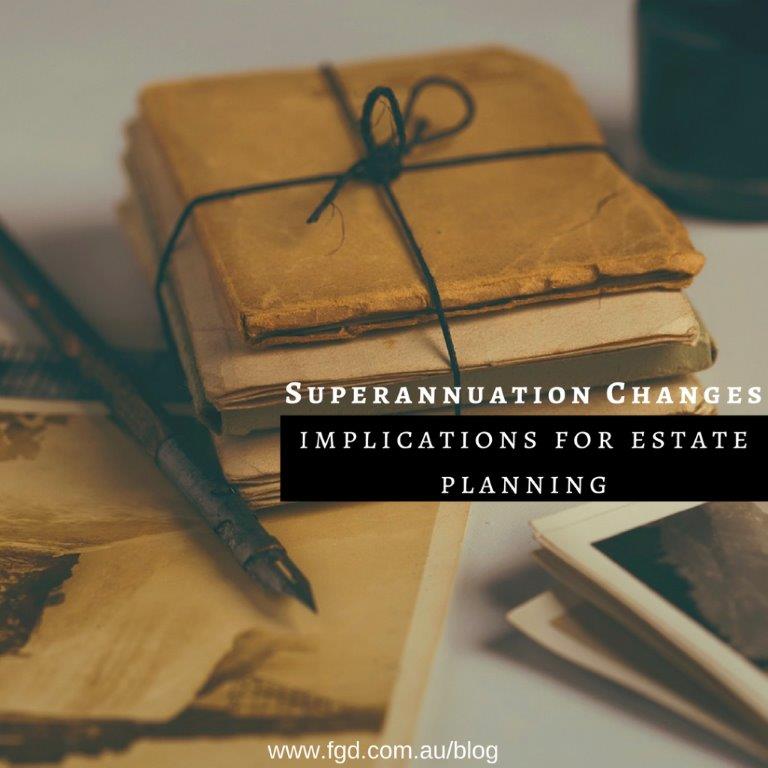
The government has released exposure drafts of the suite of their proposed legislative changes to superannuation. While they are just draft and subject to changes both before they are tabled into parliament and after any horse trading before becoming law they do bear some consideration.
While the focus of the changes has been on the impact on retirement planning a lot of the hidden impacts are really on the estate planning side. Things have just become more complicated!
A common practice is to make your pension reversionary so that on the death of the first member of a couple the surviving spouse will have the benefit of continuing to receive the pension that the deceased member was receiving without needing to cash out the benefit. Pension accounts are generally tax free after age 60. Accumulation accounts are generally subject to tax of 15% per annum.
The major change to the legislation from an estate planning perspective is the imposition of a $1.6 million balance cap on pension accounts. This cap commences on 1 July 2017 for existing pensions and will be indexed going forward.
Any amounts over the cap will need to be commuted back to accumulation or be cashed out. It should be noted that the balance cap is fixed for life. It can grow but you will not be able to top it up if it drops in value (for example, if the value of the investments drop due to a property or stock market crash). This will require careful consideration of what assets are funding the pension account.
The balance cap is personal. So if you are a couple where the total amount in your pension accounts exceeds the cap this may be a problem when one of you dies and your pensions are reversionary. For example a husband may have $1 million in his account and the wife may have $700,000 in her account. When one of them dies the cap for the survivor will have been exceeded by $100,000. The surviving spouse has the following options:
- Commute all or part of their pension or the death benefit back to an accumulation account.
- Cash out all or part of their pension or the death benefit so that they receive it in their personal name
Six months after death any entitlements which are commuted to accumulation are treated as member benefits and taxed accordingly. This is particularly important if the surviving spouse has not yet reached their preservation age as the benefits will be effectively locked in.
There are two alternative strategies to spouse reversionary pensions:
- have the benefit paid to minor or disabled children by way of a child pension; or
- have the benefit paid to superannuation death benefits proceeds trusts established in the will of the deceased.
If a child receives a pension on the death of their parent they will inherit the parent’s cap. If both parents die they will have the advantage of both caps (i.e. $3.2 million) from which a pension can be received. Any excess over this amount would need to be paid to the child as a lump sum.
The sting however in a child pension is that any benefit remaining must be cashed on the child turning 25, unless they are disabled. If there is a concern about a child receiving a large sum of money at this age a superannuation proceeds trust may be an alternative. The balance cap they inherit from their parent will not be counted to their own balance cap when they retire.
I have written in the past about the benefit of superannuation proceeds trusts however the addition of the balance cap adds another argument for including them in your estate plan. As the benefit is paid as a lump sum to the estate and not as a pension the balance cap does not pose an issue. The income received by the beneficiary from the trust would however be taxed.
As anything in estate planning there is no one size that fits all. It is a matter of balancing asset protection and flexibility. The above is only a brief summary of the impact of some of the planning challenges that the proposed legislative changes pose. It will require a greater degree of collaboration between experienced superannuation and estate planning lawyers and financial planners to ensure that clients needs are effectively tailored to their personal circumstances.
If you are concerned about how the superannuation changes will impact on your estate plan I urge you to contact us so we can advise you prior to the commencement of the proposed changes on 1 July 2017.

Paul Salinas is a Family Lawyer and Superannuation Expert at Farrar Gesini Dunn, Canberra Office.